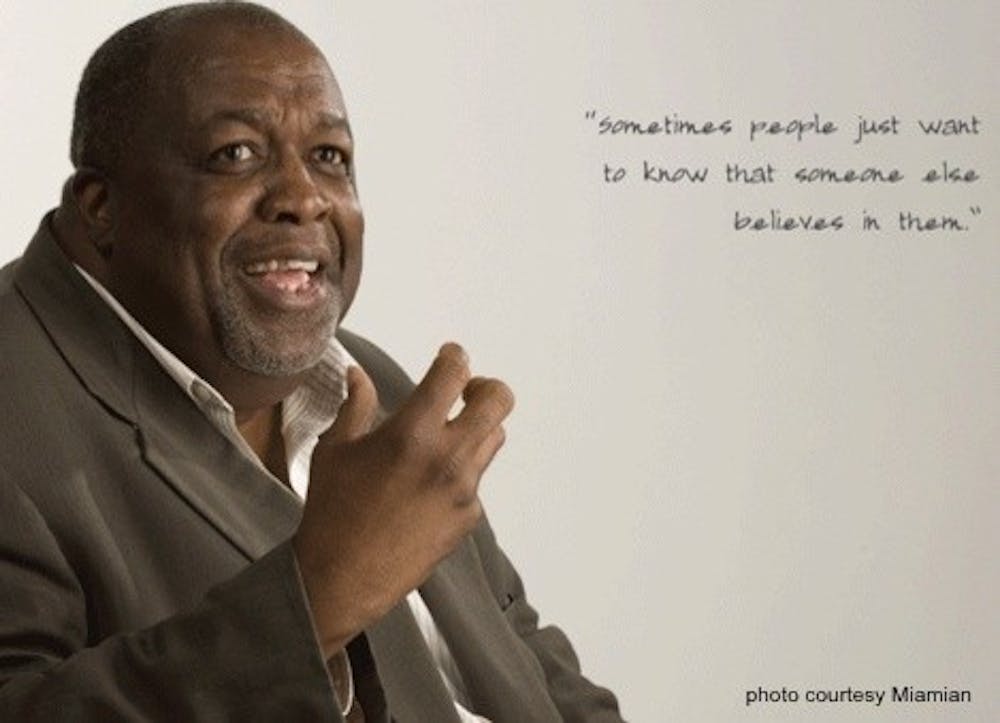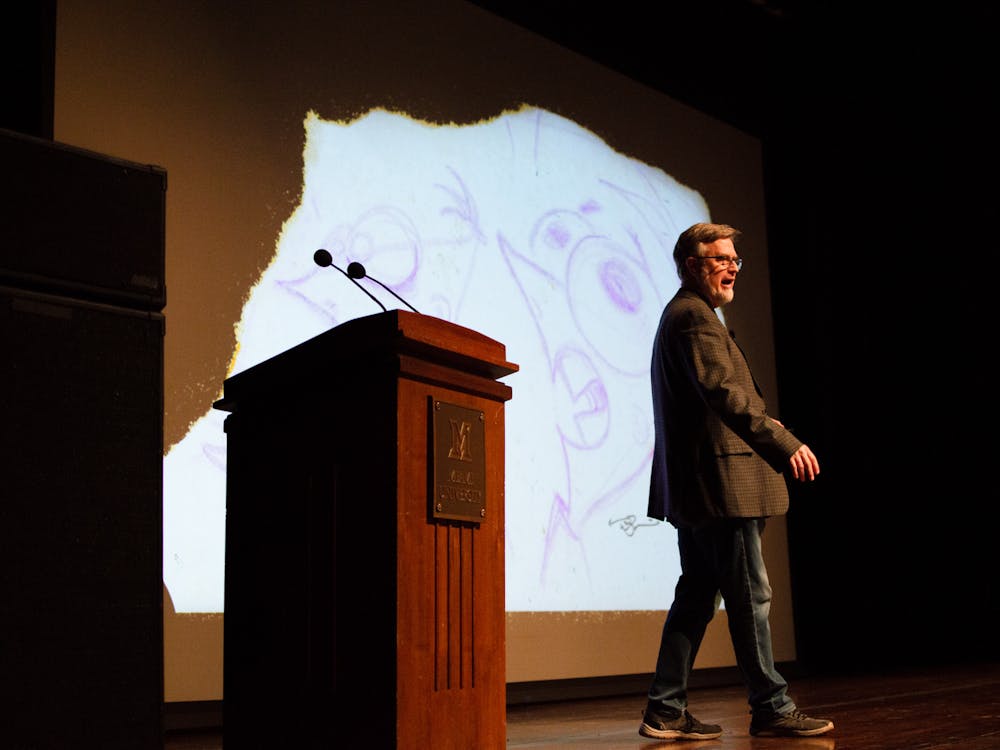Augustus Jones
By Grace Moody and Justin Maskulinksi, News Editors
Augustus "Gus" Jones, a political science professor at Miami University, died unexpectedly Thursday, Dec. 3.
Provost Phyllis Callahan sent out an email to faculty the next afternoon.
"It is with great sadness that I inform you of the death of our colleague," Callahan wrote.
Jones' career at Miami started in 1987. Jones graduated from Clark University in 1974 with a Bachelor of Arts and later earned his doctorate from Washington University in St. Louis in 1980.
Jones was a well-liked and influential professor, as well as a researcher of American civil liberties, according to a memo written by Patrick Haney, chair of the Department of Political Science.
"This is an incredibly sad day for all of us," Haney said in the memo. "Dr. Jones was a very special person, friend and colleague-- unfailingly upbeat and supportive, a great teacher, a thoughtful scholar …"
Jones was awarded Outstanding Educator by the Miami University Alumni Association in 1999 and was named the Distinguished Educator by the College of Arts and Science in 2002.
In an article published in The Social Science Journal, Jones and Peter Bishop researched the interaction of the lower federal courts and bureaucrats that assisted in the development of a "national, antidiscrimination AIDS policy in the field of education."
This article, published in 1990, was titled, "Policy making by the lower federal courts and the bureaucracy: The genesis of a national AIDS policy."
Jones had another article published in The Social Science Journal in 2007 with Michelle D. Deardoff titled, "Implementing affirmative action in higher education: University responses to Gratz and Grutter."
Enjoy what you're reading?
Signup for our newsletter
According to the abstract, this academic article focuses on the U.S. Supreme Court's decisions on two cases on affirmative action's place in higher education.
In the case Grutter v. Bollinger, the Supreme Court decided in favor of the University of Michigan Law School, allowing them to use race as one of many admission considerations, as it could lead educational benefits through a more diverse learning environment.
The second case in Deardoff and Jones' article, Gratz v. Bollinger, also featured the University of Michigan, but this time the claim was that too much of the admission decision was focused on race.
This time, the Supreme Court concluded the University violated the Equal Protection Clause of the Fourteenth Amendment.
In the article, Deardoff and Jones found schools in the Fifth Circuit (southern) do not consider race when making admissions decisions, while the schools the Sixth Circuit (Midwestern) do.
Jones also looked at the two cases in his 2006 work titled, "Splitting the Baby: Media Constructions of Grutter v Bollinger and Gratz v Bollinger."
According to Miami's Department of Political Science website, Jones most recent work focused on President George W. Bush's civil rights record, specifically regarding affirmative action, education and voting rights.
Haney said Harrison Hall wouldn't be the same without Jones. He will be missed among Miami students and faculty.
"This is an incredibly sad loss," Haney said. "Gus was a great teacher, friend and colleague."
President David Hodge tweeted about Jones' death on Friday.
"Deeply saddened by the unexpected death of Dr. Gus Jones," Hodge wrote, "beloved professor of political science and constitutional law, mentor, and friend."
Many former students and colleagues responded on Twitter.
"Absolutely, without a doubt, one of the most influential professors I ever had," one response said.
Haney said the department administration is distributing final grades for Jones' students.
Haney said the significance of this loss is hard to describe. He is working with other political science faculty to organize a way to honor Jones' memory.
Jones is survived by two children, Juanita and Augustus Jr.
Henon Wilkins
By Bonnie Meibers, Senior Staff Writer
Heanon Wilkins died Dec. 16 in Oxford. The former Miami professor, who retired in 1992, did not leave this world short of accomplishments.
Wilkins was Miami's first tenured track African-American faculty member when he was hired in 1968. He went on to be promoted to full professor.
Toward the end of his career, in 1992, Wilkins earned the Benjamin Harrison Medallion. The medallion is one of the highest recognitions Miami offers faculty for teaching, research and service to the university.
"He was a man who saw teaching as service, as an obligation to help others to know, to understand and to grow," said Larry Young, Miami alumnus and former director of Office of Minority Student Affairs, which is now called the Office of Diversity Affairs.
There is also a fellowship in Wilkins' name, the Heanon Wilkins Faculty Fellowship. This faculty fellow has to have completed their doctorate or equivalent degree and is invited to Miami to teach for either one or two semesters with a reduced course load. This allows them to focus on research, something Wilkins did throughout his life.
His own academic journey started at Howard University, a historically black college in Washington, D.C., where he earned his B.A. in romance languages. Wilkins went on to graduate school at the University of Wisconsin-Madison. This is where he met his wife, Constance. Both were working on degrees in Spanish.
In his time at Miami, Wilkins taught all levels of Spanish, but focused most on conversation and language courses. Both his and his wife's specialty was Medieval Spanish Literature.
Constance and Heanon were married for 45 years.
"We always had adjoining offices-not necessarily because we asked for them," she said. "It was handy to borrow each other's books."
Heanon was asked to set up an Equal Opportunity Office in 1969, around the time of the Kent State shootings. The office's purpose was to encourage minority students to come to Miami. According to Constance, many minority students would not have been successful in academics without her husband.
"He started a lot of the early efforts to diversify this campus," said Dr. Charles Ganelin, a Spanish professor at Miami, Altman fellow and friend of the Wilkinses.
Heanon later became the director of Black World Studies. He was instrumental in hiring other African-American faculty and encouraging minority students to attend a Miami that had little diversity at the time.
"He believed in his field and believed in his teaching," said Ganelin.
Those who knew Heanon described him as a warm, gentle person. He was a beloved professor and had an impact on countless students.
"He made you a friend immediately," Ganelin said. "He's missed, you can tell… there is a void in the world."
Wilkins was born in Neville Island, Pennsylvania, but lived most of his childhood and adolescence in Washington D.C. The Wilkinses lived at The Knolls of Oxford, and Constance will continue to live there.
Andrew Cayton
By Grace Moody and Justin Maskulinski, News Editors
Andrew "Drew" R. L. Cayton, a longtime Miami University history professor, died Thursday, Dec. 17 after seven months battling cancer.
Cayton, who was 61 years old, taught at Miami for 25 years.
After his death, Wietse de Boer, history department chair, spoke of Cayton's commitment to education and his popularity among students.
One of those pupils, Miami alumnus Scott Barkett ('12), said Cayton had a huge impact on his students.
"From the first day he really cared about the teaching aspect of his job," Barkett said. "He really brought that passion to class every day."
Barkett said Cayton presented class material in an interesting way and always pushed students to learn more.
"He made you feel like a million bucks," Barkett said. "He was so talented that you wanted to seek his praise a little more."
In a tweet Miami President David Hodge wrote: "Deeply saddened by the death of Drew Cayton, the epitome of the teacher-scholar much beloved by students and colleagues."
Cayton's distinguished teaching career also took him to Harvard University and Wellesley College. This fall, Cayton moved to Ohio State University, where he was appointed the Warner Woodring Chair in Early American History.
Much of Cayton's academic work focused on the frontier age of the United States.
In 1996 Cayton authored a book titled, "Frontier Indiana" where he focused on the lifestyles and world views of the people in Ohio's neighbor state during the frontier period.
Cayton also wrote about Ohio in the "The Frontier Republic: Ideology and Politics in the Ohio Country, 1780-1825." He co-edited, "The American Midwest: An Interpretive Encyclopedia" with Richard Sisson and Christian Zacher in 2007.
The Garamond Agency, a full-service literary agency, states Cayton wrote essays and reviews that appeared in the New York Times Sunday Book Review, the Los Angeles Times Sunday Book Review and The Journal of American History, among others.
Cayton's most recent project was a volume in the Oxford History of the United States, in which he and Fred Anderson were telling the story of pre-Revolutionary era.
"To the History Department, the College of Arts and Science, and the entire University, he gave tirelessly of his wisdom and warmth … A scholar's scholar, a teacher's teacher, a colleague, a friend, and a mentor: We will always remember Drew and what he gave Miami," de Boer wrote in a history department memo.
Cayton is survived by his wife Mary Kupiec Cayton, who also worked in Miami's history department, and their two daughters Elizabeth and Hannah.
A memorial service for Cayton was held at the Holy Trinity Episcopal Church in Oxford.




